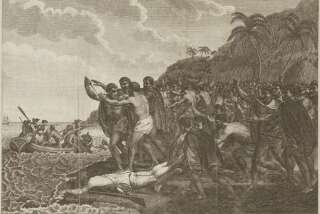A Story of Massacre, Captivity : Englishman’s Journal Tells of Northwest Adventure
TORONTO — John Rodgers Jewitt was a 19-year-old blacksmith living in Hull, England, when the captain of a visiting American brigantine invited him on a voyage to the Pacific Northwest. The year was 1802.
What followed, as Jewitt recounts in a gripping journal now republished in a special annotated edition, was a bloody adventure that makes Robinson Crusoe seem like a fairy tale.
Three weeks after the U.S. trading ship Boston sailed into Nootka Sound on the west coast of Canada’s Vancouver Island, native Indians angered by insults staged a massacre of the crew, cutting their throats and gruesomely lining the deck with 25 severed heads.
The only survivors were Jewitt, who suffered a gashed forehead, and a sailmaker who secreted himself in the hold during the melee.
The two were to remain slaves of the local Indian chief, Maquinna, for more than 2 years before another ship came to their rescue.
“The Adventures and Sufferings of John R. Jewitt: Captive of Maquinna,” published in Canada by Douglas & McIntyre Ltd. and in the United States by the University of Washington Press, is not just a gory tale about savages and hardship.
It is a scrupulous diary of how Northwest coastal Indians lived at the start of the 19th Century, from the shredded cedar bark cloaks they wore to the order of seating in canoes and the blubbery oil they plastered over all their food--from salmon to strawberries.
“I’d known about Jewitt for some time,” said Vancouver ethnologist and artist Hilary Stewart, who provided nearly 300 annotations and 200 drawings for the book and compiled its first index.
“It occurred to me what an astounding story it really was, and the general public just didn’t know about it,” she said.
Jewitt published his simple journal within months of returning to Boston in 1807, and with the help of a professional writer expanded it into a full-length narrative in 1815.
The longer version has appeared in 20 editions over the years, including a German translation, and has inspired at least one novel. Vancouver TV producer John Ketcham is working on a film adaptation.
During three years of research, Stewart tracked down the English captive’s descendants, John Rodgers Jewitt IV, V and VI, living in the United States, and Northwest Indians still bearing the name Maquinna.
“Very little of the culture survives, but some of the ceremonies and values are coming back,” she said of the 200 or so Mowachaht and Muchatlaht Indians in Vancouver and Nootka Sound.
She discovered that after his rescue, Jewitt married English migrant Hester Jones and settled in Connecticut, where they had five children. He traveled the country promoting his story before dying in Hartford at the age of 37.
According to Indian oral legend, Maquinna was drowned by an uncle whose village he tried to raid.
More to Read
Sign up for The Wild
We’ll help you find the best places to hike, bike and run, as well as the perfect silent spots for meditation and yoga.
You may occasionally receive promotional content from the Los Angeles Times.





